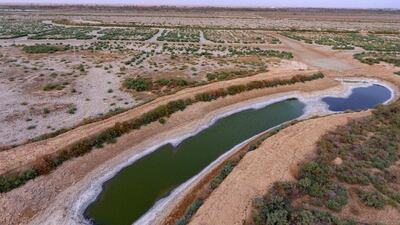Amid a worsening water crisis at home, Iraq’s foreign minister used his time at the UN podium on Saturday to call on upstream neighbours to reduce their use of waterways that flow into the country.
Addressing the United Nations General Assembly in New York, Ibrahim Al Jaafari said: "We also call for a restoration to Iraq of our water resources, because the loss of these resources has reduced the level in the Tigris and Euphrates rivers."
Iraq is in the midst of an unprecedented drought, which has eclipsed previously notable low-rainfall years in 2009 and 2015.
Lower than average rainfalls, higher summer temperatures thought to be associated with climate change, and reduced river flows from upstream – as Turkey begins to fill a controversial dam – have combined to create a complex environmental and social crisis in the country’s south.
Once known as Mesopotamia, or "the land between the rivers", Iraq is uniquely dependent on upstream neighbours for water. The headwaters of the country’s two main rivers – the Tigris and the Euphrates – descend from the Armenian highlands of eastern Turkey.
Since the 1970s, a series of dams has gradually reduced the flow of both watercourses. When the Ataturk Dam opened in 1990, it reduced the Euphrates to a trickle, while its 27-billion-cubic-metre reservoir filled.
Earlier this year, Turkey began filling the reservoir behind the Ileus dam sooner than expected. Iraq was taken by surprise as the Tigris river dropped precipitously. By early June, people in Baghdad were able to walk from bank to bank as the river flowed knee-deep, metres below its normal level.
As the summer wore on, Iraq's cultivated areas were reduced by half compared to the previous year. The government banned the farming of crops such as wheat and rice that require major irrigation. Herds of cattle in the south of the country were reduced by a third as animals died of thirst or were sold off by desperate farmers unable to afford to buy their feed and water.
There are now real fears that Iraq’s southern marshes – destroyed by Saddam Hussein and then famously restored following his overthrow in 2003 – may disappear again.
Farmers walking off their lands and moving to the cities has not been the worst of the crisis. In the oil-rich city of Basra, Iraq's second largest city, the salinity of the drinking water has become so high that nearly 100,000 people have been hospitalised with poisoning.
Some residents blame Iran, saying upstream desalination plants on the Shatt Al Arab are decreasing the potability of water. Angry protests over services have turned violent, with security forces killing dozens as they struggle to maintain order.
In the face of a mounting environmental catastrophe, Iraq has appealed to its neighbours for relief. For the first time this summer, Kuwait sent tankers of water from its desalination plants to Basra, in an echo of a historical trend by which Kuwaiti dhows used to return from trading in Basra with their holds filled with drinking water.
But, as the downstream state, there is little Iraq can do to compel Turkey and Iran to decrease their demands on waterways that drain into Iraq, leaving the government unable to do more than offer stark warnings.
“The water level, which has led to an adverse environmental and economic impact, will have serious repercussions for the future,” Mr Jaafari concluded at the UN.

